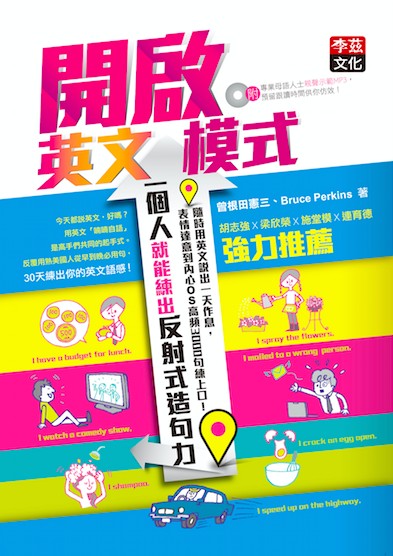
還是每年許一次「我一定要學好英文」的新年新希望?
趕快開啟英文模式,跟著日常作息隨時隨地「用」英文!
每天遇到那個情境時,嘴巴就自動唸一次,
一個人就能練出「反射式造句力」!
「早上又睡過頭!天天都要追趕公車,今天下雨換公車遲到了!一到公司馬上就去開會,中午終於可以好好休息吃頓大餐,晚上又得加班趕報告,不過沒關係,我早就預錄了今晚播出的最愛影集!」
你可以用英文說出這樣的一天日常嗎?相信有不少人無法立即脫口而出。想想兒時牙牙學語,媽媽對你說:「飯飯、狗狗、車車⋯⋯」你馬上跟著說,連續說三天,這些字詞就永遠放進腦袋,一輩子也忘不了。學英文就像學母語一樣,天天說、隨時說,一旦內化成自己的東西,一輩子運用超自如!
不管你是搭捷運、火車或公車上下班,除了上車下車,搭車會用上的英文你都會說了嗎?今天就開啟英文模式,熟悉搭車英文,每搭乘一次就說一次,隨時隨地讓英文成為你生活的一部分!《開啟英文模式, 一個人就能練出反射式造句力》作者認為,亞洲人英文學不好,因爲我們沒有把英文當工具來用。苦讀英文多年的人可能有辦法認得 hypersomnia(嗜睡症)、tax refund (退稅)等托福或多益考試常考字,但卻連「I overslept!(我睡過頭了)」這麼簡單的生活用句也無法脫口說出,悖離了「學習語言是為了溝通」的初衷。想開始真正「用」英文,就盡可能跟著日常作息天天反覆「用」出來。別再用沒機會和母語人士進行對話為藉口,每天開啟英文模式,嘗試用英文喃喃自語,是讓英文大躍進最快的偷吃步。
高頻描述句 到達車站
I get to the station.
I go up the station steps.
I get on the escalator. *get on=take
I take the elevator up.
I head for the ticket wicket. *ticket wicket=ticket gate
我走上車站的階梯。
我站上手扶梯。
我坐電梯往上。
我走向驗票口。
高頻描述句 買票
I go to the ticket sales counter. *ticket sales counter →ticket sales machine
I buy a ticket at the vending machine.
I stand in line to buy a ticket. / I queue up to buy a ticket.
I buy the wrong ticket.
My train pass has expired. *expired=run out
I recharge my train pass.
我走向售票櫃檯。
我用機器買一張票。
我排隊買票。
我買錯票了。
我的火車月票過期了。
我替我的火車月票加值。
喃喃自語 買票
Tickets are expensive, aren』t they?
It’s 35 dollars to get to Taipei Main Station?
Tickets on this line are expensive compared to other lines.
*on this line=for this line *compared to=compared with
I bought the wrong ticket by mistake.
車票好貴,可不是嗎?
到台北車站要35 元?
這條線的車票比其他線要貴。
我誤買了錯的車票。
我買到貴20日圓的車票。
我必須去退票才行。
我的火車月票今天到期。
回家時我要買一張新的火車月票。
高頻描述句 驗票口
I put the ticket in the ticket wicket machine.
I touch the ticket gate with my train pass.
I go through the gate.
我把票放進驗票口的機器裡。
我用我的火車月票輕觸驗票口。
我通過驗票口。
高頻描述句 月台
I head for the platform. *head for=go to
I go down the steps to the platform *steps=stairs
I wait on the platform for my train to come.
I walk to the women’s waiting area.
我走向月台。
我下樓梯到月台。
我在月台上等火車來。
我走到女性專用車廂的停車位置。
高頻描述句 坐電車
We line up in two rows to get on the train. *line up in =stand in
It’s right on time.
I get on the train.
I get on a local train.
I take an express train.
我們排成兩排依序上車。
剛好準時。
我上車。
我上了慢車。
我坐快車。
高頻描述句 在車廂裡
I look for a seat.
I find an empty seat.
I sit down. / I take a seat.
I stand in front of someone who looks like he’s going to get off soon.
I look for a priority seat.
I sit in a priority seat.
I stand up when an elderly person gets on.
I offer my seat to an elderly passenger. *offer=give
I put my bag on the luggage rack. *luggage rack=luggage shelf
I hold onto a strap. *hold onto=grab
I lean against the door.
我尋找座位。
我找到一個空位。
我坐下。
我站在一個看起來快要下車的人前面。
我尋找博愛座。
我坐博愛座。
當有一位老人上車時,我便站起來。
我讓座給老人。
我把我的提袋放在行李架上。
我抓住吊環。
我靠在門上。
喃喃自語 車廂擁擠時
It’s crowded, isn』t it?
It’s packed, isn』t it? *packed=overcrowded
It’s crowded and hard to breathe.
This line is always crowded.
There are too many people.
Don』t push. *push=shove
Don』t lean on me.
Well, I』m gonna lean on him.
Hey, that guy stepped on my toes. *guy=person
I hate rush hour because it’s always like this.
好擠,可不是嗎?
塞得滿滿的,可不是嗎?
有夠擁擠而且讓人喘不過氣來。
這條線總是很擠。
人太多了。
別擠啊。
別靠在我身上。
嗯,我決定靠在他身上。
喂,那傢伙踩到我的腳了。
我討厭尖峰時間,因為總是會這樣。
喃喃自語 車廂很空時
Today, it’s empty for a change.
The train is empty.
I wonder if there are any empty seats.
Oh, there’s an empty seat over there.
Somebody else sat down. *Somebody else=Someone else
今天難得很空。
車廂空空的。
不知道會不會有空位。
喔,那裡有個空位。
被別人坐走了。
喃喃自語 坐下
I hope the person in front of me gets off soon.
That person folded up his newspaper.
It looks like he’s going to get off at the next stop. *stop=station
Well, I』ll stand in front of that person.
Finally, I can sit down.
I』m lucky today.
The seat’s a little small, isn』t it?
Why won』t this person scoot over a little?
Isn』t this person taking up two seats? *taking up=occupying
Don』t put packages on the seat. *packages =bags
I want people to put them on their laps.
希望在我面前的這個人趕快下車。
這傢伙折起了他的報紙。
看起來他會在下一站下車。
嗯,我要站到那個人的面前。
我終於可以坐下了。
我今天很幸運。
這座位有點小,可不是嗎?
這個人怎麼不坐過去一點啊?
這個人佔了兩個位子吧?
別把行李放在座位上。
希望大家能放在自己的大腿上。
重複是學習語言的王道!
其實把英文學好的終極秘訣,我們早就會了!那就是:重複再重複。平常不管是開會談公事,還是聊八卦聊是非,我們為什麼可以一句一句中文嘰哩呱啦冒出來,連想都不必想詞彙或句型結構,就是因為我們從小到大一直在重複中文句子,講到已經成了潛意識。口說英文也是同樣的道理,不必用太難、太華麗的字眼或句型,把簡單的句子講到滾瓜爛熟,直到變成反射動作,置身某個情境就能脫口說出那個情境的英文句子,英文自然不會再卡卡。
《開啟英文模式,隨時用英文說出一天作息》就是採用這樣的原則,幫大家把一整天會碰到的情境跟對應的英文句子整理出來,方便大家以正確道地的英文不斷重複,每天遇到那個情境時,嘴巴就自動唸一次,日積月累後絕對會有「我英文變流利」的感覺。但可別以為這本書只有初中階的程度,如果要讓效果加倍,我建議以下幾個方法:
轉時態:把現在式變成過去式、未來式、進行式等。
換問句(或否定句):把直述句變成問句。
加情緒:不要光唸,要「演出來」,因為情緒是增加記憶的一個大法寶。
動嘴巴:不要默唸,要唸出聲音,嘴巴才會形成肌肉記憶。
加句型:平常看外國電影或看其他英文讀物時,發現適用在你自己生活情境的句子,不妨記在這本書相對應的章節,把大腦的英文資料庫無限擴充。
英文說穿了就是一種技能,這常常讓我想到英文的一句話:「Repetition is the mother of all skills」(重複是技能之母),也就是「重複成習慣、習慣成自然」的道理。這麼說來,英文厲害跟肉腳之間的差別,就在於重複的小動作而已。沒錯,就這麼簡單,所以先搶先贏,現在就應該趕快來重複,開啟你大腦的英文模式!
喃喃自語 班車誤點或停開等意外事故
It’s a little bit late.
They say there was some kind of accident.
The trains are late because there was an accident.
They say the trains are stopped due to an
accident.
Are they postponing the trains? *postponing=delaying
Come on, get the train going again. *going=running
I』ve already been waiting for an hour.
They don』t know when the train will start
running again?
How am I going to get home? / What’s the best way to
get home?
The trains aren』t running today due to a
typhoon.
有點延遲。
據說有發生某些意外事故。
火車因意外事故而延遲。
據說火車因為意外事故而停駛了。
他們現在是要延後車班嗎?
拜託,趕快再度開動火車吧。
我已經等了一小時。
他們不知火車何時才會重新開動嗎?
我回得了家嗎?
由於有颱風,所以火車今天停駛。
喃喃自語 車廂內廣告
I wonder if there are some interesting advertisements.
There are a lot of advertisements.
The weekly magazine ads are pretty interesting.
Oh, there’s our company’s advertisement.
Our company’s drinking water ad is on the wall.
沒什麼有趣的廣告嗎?
有好多廣告。
週刊雜誌的廣告相當有意思。
喔,那是我們公司的廣告。
我們公司的飲用水廣告貼在牆上。
高頻描述句 緊急剎車SOS求救句
The train rocks. / The train sways.
When the train moves I get pushed.
The train brakes suddenly.
My feet get stepped on.
I step on someone’s feet accidentally. *feet → foot
He is staring at me.
I apologize to the person.
火車在前後搖晃。
每當火車一動,我就會被人擠到。
火車突然緊急煞車。
人們踩到我的腳。
我不小心踩到別人的腳。
那個人瞪我。
我向那個人道歉。
高頻描述句 下車
I take my bag down from the luggage rack. *luggage rack=luggage shelf
I get off the train.
I get off at the usual station. *usual=regular
I get off at the next stop. *stop=station
I hurry and get off the train.
I get pushed as I get off the train. *as=when
我把我的提包從行李架上拿下來。
我下火車。
我在平常下車的車站下車。
我在下一站下車。
我匆忙下車。
我下車時被推了一把。
高頻描述句 轉乘
I go up the stairs. *stairs=stairway; steps
I change trains. / I transfer trains.
I move to the next platform.
I go to the opposite platform. / I go to the other side of the platform.
I get on another train. / I take another train.
I get on a train for Taichung.
I transfer for a train for Taichung.
I change to a local train.
我走上階梯。
我轉車(轉乘)。
我移動到下一個月台。
我走向對面的月台。
我坐上另一台火車。
我坐上開往台中的火車。
我轉乘開往台中的火車。
我轉乘慢車。
高頻描述句 坐過站SOS求救句:
I missed the train.
I missed my usual train.
I fell asleep on the train.
I fall asleep and go past my station. *go past=ride past
I hurry up and catch a train back to the station.
我錯過火車了。
我錯過平常坐的那班車了。
我在車上睡著了。
我睡過站了。
我急急忙忙地趕上開回該站的火車。
高頻描述句 出驗票
I go through the ticket wicket. *ticket wicket=ticket gate
I head for exit A4.
我走出驗票口。
我走向A4出口。
說明:
以上例句依不同使用功能區分為:
高頻描述句:日常生活每日會用到的語句,用來描述事情經過或事物狀態。
喃喃自語:常是對自己說的話,包括內心浮現的事物、感想,甚或難以說出口的內心 OS。
SOS求助句: 針對特殊狀況如搭車過站或緊急煞車等會脫口說出的求救句。
本文授權刊登自李茲文化/ 曾根田憲三, Bruce Perkins《開啟英文模式,一個人就能練出反射式造句力:隨時用英文說出一天作息,表情達意到內心OS高頻3000句練上口!》

《開啟英文模式,一個人就能練出反射式造句力:隨時用英文說出一天作息,表情達意到內心OS高頻3000句練上口!》
作者:曾根田憲三, Bruce Perkins
出版社:李茲文化
圖片來源:pixabay
|